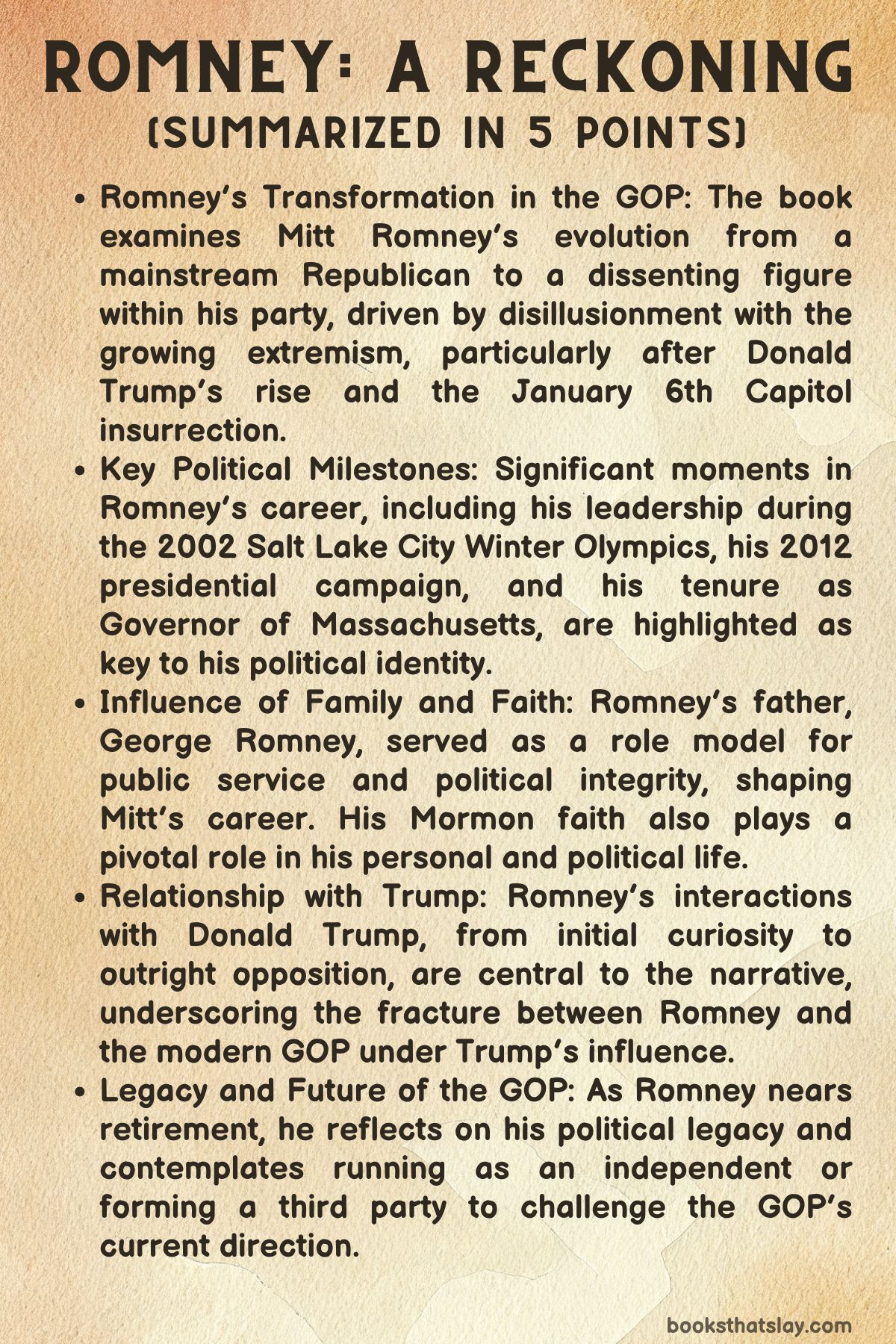Romney: A Reckoning Summary, Analysis and Themes
“Romney: A Reckoning” by McKay Coppins is an in-depth exploration of Mitt Romney’s political career, examining his journey from a respected establishment figure within the Republican Party to a voice of dissent as the party evolved.
Coppins, a fellow Mormon, shares a unique connection with Romney, allowing a rare glimpse into the personal and professional dimensions of the former presidential candidate’s life. The biography delves into key moments in Romney’s career, his personal beliefs, and his evolving relationship with the changing Republican landscape, offering a detailed portrait of a politician who has often been at odds with his own party.
Summary
The book opens in January 2021, as Mitt Romney and his wife Ann grow increasingly concerned about the volatile response to the 2020 election results. While Ann is apprehensive about his safety in Washington, Romney feels a duty to witness the certification process firsthand.
As rioters breach the Capitol on January 6, Romney is furious with Donald Trump and Ted Cruz for their roles in fueling the unrest. This incident becomes a pivotal moment in Romney’s political narrative, sharpening his disillusionment with the modern Republican Party.
Coppins reveals that Romney and he met regularly to discuss the profound changes within the GOP, reflecting on Romney’s place in a party he no longer recognizes.
As Romney contemplates retirement, he becomes more candid about the frustrations he feels with the direction the Republican Party has taken.
Romney’s reverence for his father, George Romney, emerges as a central theme in the book. George’s influence shaped Mitt’s approach to both business and politics.
George, who built a career in the auto industry before becoming Governor of Michigan, was known for his commitment to civil rights, an unusual stance for a Republican at the time. However, his presidential ambitions ended when he made an ill-fated remark about having been “brainwashed” into supporting the Vietnam War.
The teenage Mitt learned critical lessons from observing his father’s political downfall, lessons that would later inform his own cautious approach to public life.
Born into privilege, Romney led a life marked by affluence but also discipline. His relationship with Ann, who converted to Mormonism for him, and his experiences as a missionary in France, where he survived a serious car accident, deepened his resolve.
After returning to the U.S., he married Ann and embarked on a successful career in business, eventually landing at Bain & Company. As his wealth grew, so did his political ambitions.
His first serious foray into politics was an unsuccessful Senate campaign against Ted Kennedy in 1994, where he adopted a pro-choice stance to appeal to Massachusetts voters.
Romney’s role as the CEO of the 2002 Salt Lake City Winter Olympics showcased his leadership during a critical moment, transforming a scandal-plagued event into a national success.
This achievement laid the groundwork for his election as Governor of Massachusetts, where he implemented healthcare reforms that drew national attention but also alienated conservative Republicans.
In his subsequent presidential campaigns, Romney struggled to balance his moderate image with the increasingly conservative bent of the Republican Party. His Mormon faith and perceived detachment from ordinary voters made it difficult to connect with evangelical and grassroots factions.
Despite a more concerted effort to court conservatives in his 2012 campaign, Romney lost to Barack Obama.
The rise of Donald Trump marked a turning point in Romney’s political journey. Initially dismissing Trump, Romney became one of his most vocal Republican critics once Trump was elected.
Despite fleeting moments of conciliation, such as Trump’s offer of the Secretary of State position, Romney remained firm in his opposition. His tenure as a U.S. Senator from Utah saw him increasingly isolated within his party, especially after the Capitol insurrection.
At this stage in his career, Romney is considering his legacy, even contemplating running as an independent to challenge the GOP’s current trajectory.

Analysis and Themes
The Conflict Between Political Integrity and Party Loyalty
One of the central themes of Romney: A Reckoning is the tension between political integrity and party loyalty, particularly in the modern Republican Party. Mitt Romney’s career reflects a consistent commitment to certain personal and political ideals, many of which he inherited from his father, George Romney.
However, as the Republican Party underwent significant changes, particularly in the wake of Donald Trump’s rise, Romney found himself increasingly at odds with the party’s direction. Coppins explores how Romney’s relatively static political beliefs — particularly his moderate stances on issues like healthcare and gun control — placed him in conflict with a party increasingly dominated by right-wing populism and Trumpism.
The tension between Romney’s values and the party’s shifting priorities raises deeper questions about the role of conscience in politics, the limits of compromise, and the price one must pay to remain loyal to a political movement that no longer reflects one’s core beliefs.
The Evolution of the Republican Party and its Impact on Conservative Identity
Coppins traces the profound changes within the Republican Party over the last few decades, positioning Romney as a case study in how these shifts have transformed conservative identity. Early in his career, Romney’s brand of conservatism—rooted in pragmatism, data-driven policymaking, and a certain moral decency—was emblematic of the mainstream Republican ethos.
Yet, as figures like Donald Trump, Ted Cruz, and the Tea Party gained influence, the party’s ideology took a sharp turn toward populism, nationalism, and anti-establishment rhetoric. The insurrection on January 6, 2021, serves as a stark symbol of this transformation.
Romney’s increasing alienation from his party reflects not just a personal journey but also a broader crisis within American conservatism. The party grapples with internal conflicts over its future direction, ideological purity, and relationship to democratic norms.
Romney’s reckoning with his place in the GOP is emblematic of the broader disorientation that many traditional conservatives feel in today’s political climate.
The Intersection of Faith, Personal Morality, and Political Decision-Making
Romney’s Mormon faith is a crucial aspect of his identity, and it plays a significant role in how he navigates the complexities of his political career. Coppins emphasizes that Romney’s moral compass is deeply influenced by his religious upbringing and the ethical framework provided by his faith.
The biography explores how Romney’s values — such as a commitment to service, honesty, and family — guide his political decisions, even when those decisions come at a high personal and professional cost. His stance against Donald Trump is portrayed not simply as a political disagreement but as a moral imperative, one that reflects his deeply held convictions about leadership, truth, and responsibility.
The tension between his faith and the increasingly cynical, opportunistic nature of modern politics is a recurring theme. Coppins highlights how personal morality can both illuminate and complicate political decision-making.
Romney’s faith often sets him apart from his peers, both as a source of strength and as a reason for his frequent isolation within his party.
The Legacy of George Romney and the Burden of Political Heritage
Coppins presents the legacy of Romney’s father, George Romney, as a crucial factor in understanding Mitt Romney’s political journey. George’s career as a corporate leader and politician, particularly his time as the governor of Michigan and his failed presidential campaign, casts a long shadow over Mitt’s life.
Mitt Romney’s admiration for his father’s courage, especially George’s outspoken support for civil rights and his willingness to challenge his own party, informs much of Mitt’s political ethos. However, the “brainwashed” remark that ended George’s presidential ambitions serves as a cautionary tale for Mitt, who is acutely aware of the dangers of political missteps.
This inherited burden drives Romney to carefully navigate his own political path, often striving to balance ambition with integrity. The book portrays Romney’s quest not only to live up to his father’s example but also to avoid repeating the mistakes that tarnished George’s legacy.
This tension between emulation and divergence from his father’s political legacy is a key element of Romney’s personal and professional narrative.
The Role of Wealth and Privilege in Shaping Political Identity
Romney’s background as a member of an elite, privileged class is another significant theme that Coppins explores in depth. Raised in a wealthy family and later amassing his own fortune through a successful business career, Romney is often portrayed as a political figure shaped by his financial security.
His wealth affords him opportunities and insulation from certain political pressures, yet it also becomes a liability at times. In an era where populism and anti-elitist sentiment run high within the GOP, Romney’s privilege disconnects him from segments of the electorate that view him as out of touch.
The infamous “47 percent” remark during his 2012 presidential campaign serves as a pivotal moment in the narrative. Coppins uses Romney’s wealth as a lens through which to explore broader issues of class, entitlement, and the intersection of money and politics in the United States.
The Personal-Public Dichotomy and the Struggles of Authenticity in Politics
Throughout Romney: A Reckoning, Coppins emphasizes the dichotomy between Romney’s personal life and his public persona. While Romney is described as a devoted family man and a person of deep moral conviction in private, he often struggles to convey authenticity in the political arena.
This theme of authenticity — or the lack thereof — is particularly salient in his presidential campaigns. His technocratic, data-driven approach often clashed with the emotional and populist appeals of his opponents.
Romney’s inability to connect with voters on a visceral level is a recurring challenge. Coppins links this to the broader difficulties faced by technocrats in a political landscape increasingly dominated by emotion and spectacle.
Romney’s personal restraint and discomfort with political theater make him appear distant and robotic to some voters, even as his close associates describe him as warm and deeply empathetic in private. This tension between Romney’s private authenticity and his public image raises larger questions about the nature of modern political leadership, where the lines between performance and principle are often blurred.


